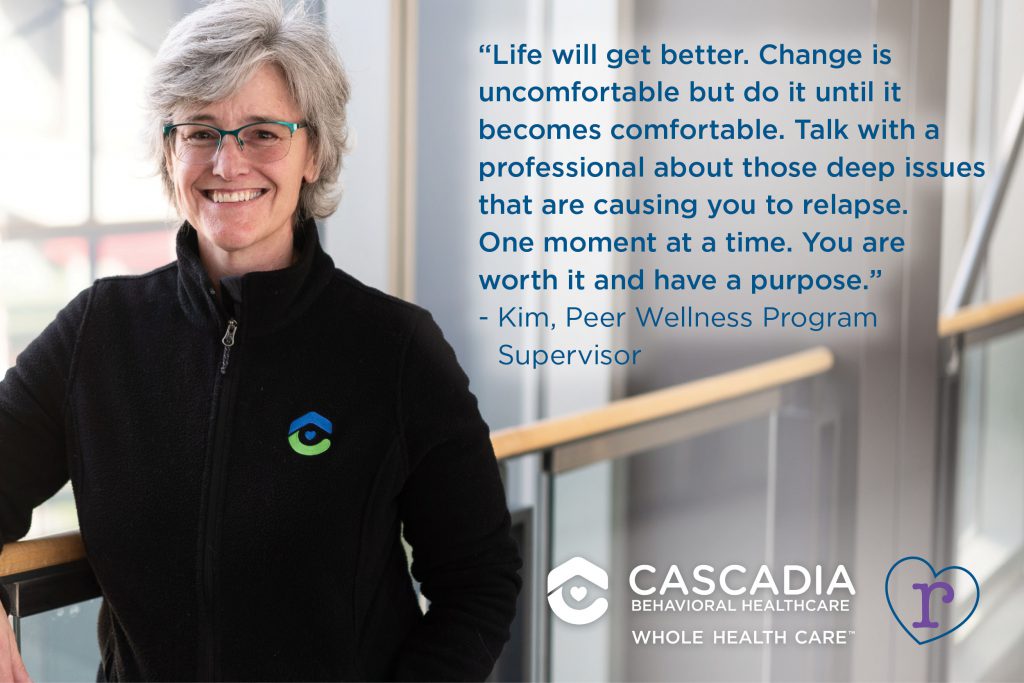September 24, 2019
Voices in Recovery, September is National Recovery Month

September is National Recovery Month. Across the country, people in recovery are celebrating their successes and sharing them with others in an effort to educate the public about treatment, how it works, for whom, and why. Cascadians are sharing their personal stories of recovery in hope that it will inspire and encourage others. Together we are stronger, and can create a #wholecommunity.
Kim
I’m a Peer Wellness Program Supervisor working in the Villebois Wellness Community providing peer services for residents who live independently.
I’ve been in recovery for substance use and mental health challenges for a little over 11 years. The first time I knew I needed help wasn’t until about age 35. Up until that point I had been using alcohol and other illegal substances to cope with anxiety, shame and the effects of childhood sexual abuse, a secret I had not told anyone until I was my husband at the time threatened to leave unless I got help. I remember sitting on my bed with the phone book thumbing through the Yellow Pages wondering where to start. So I found a licensed clinical social worker. Sitting in her office trembling, not knowing what to say, she asked a question“What was your childhood like?”. For the first time in 25 years I felt safe to tell someone of the sexual abuse I endured as a child. She told me, the abuse was not my fault and then referred me to a psychiatrist, who diagnosed me with PTSD, severe depression, and anxiety and then prescribed medication. I was relieved to know that what I had been experiencing for so long had a name and it wasn’t my fault. But by that time, I had been self-medicating with illegal drugs and alcohol for so long I continued to self-medicate to cope. I ended up divorced went down a very destructive path that nearly killed me. This path led me in and out of jail and to over 15 different treatment facilities. Everything I owned ended up in a grocery cart and I found myself wandering the streets with no hope.
In 2008 I stopped living on the streets and went into a four-year treatment program called LifeChange and did whatever it took to change. When homeless, I asked God to take my life but instead I heard, “No! You must live to fulfill a purpose!”. Recovery would not be easy, but he would guide me all the way. This gave me hope. I also believe that the many different treatment facilities I went into along the way is where I received real hope, and can recall messages of encouragement telling me to keep seeking recovery. One counselor I met with for a short time gave me a sobriety coin that had a butterfly on it. She knew I wasn’t ready to stop the cycle of addiction but her giving me that coin helped me hold on to the hope that maybe someday I could.
I learned that going to meetings and finding someone who has longer-term recovery than I did was the key to staying clean and sober. They were people I respected, trusted, that believed in me, encouraged me and would tell me the truth even if it hurt. I clung to people who believed in me and where a positive influence.
My lived experience has given me the opportunity to be a role model for others with similar challenges. I’m able to take residents to Celebrate Recovery, AA meetings and connect them to whatever recovery program that works for them. This only strengthens my own personal recovery. When I can share my story with someone and provide hope, they too can recover.
Cascadia’s whole health care vision is important. As a peer wellness provider, I play an important role on the team that surrounds a person seeking services. I recognize that I can’t do it all and need a team of experts who can provide other essential services to help a person become whole again. It is comforting to know that I work on a team of professionals who each has a role, coordinates care, communicates well, and most importantly listens to the individual receiving services. Cascadia’s whole health vision strives to lead people toward wellness.
What advice do I have for someone in early recovery? Reach out for help. Let someone know you are struggling. Never give up on recovery. Even when you have not been successful, keep trying. Go to a meeting. Life will get better. Change is uncomfortable but do it until it becomes comfortable. Talk with a professional about those deep issues that are causing you to relapse. One moment at a time. You are worth it and have a purpose. It’s okay to ask for help, you can change and live a life with living. You are valuable! You have abilities — not disabilities!
Recovery really is possible. I was receiving addiction treatment at Cascadia eight years before I was hired. Tears of joy rolled down my face as I walked down the halls of the same building I had received those services from. I had no idea at that time I would ever find a job because of my past or even live that long. All things are possible in recovery. Recovery is about discovering yourself and becoming the person you have always wanted to be. I use to think I would lose so much in recovery but the opposite is true. I am free from the darkness of addiction. Relationships have been restored. I have a new life, husband, home, a cat, an awesome job, as well as family and supportive friends.
SAMHSA defines recovery the best: A process of change through which individuals improve their health and wellness, live a self-directed life, and strive to reach their full potential.
